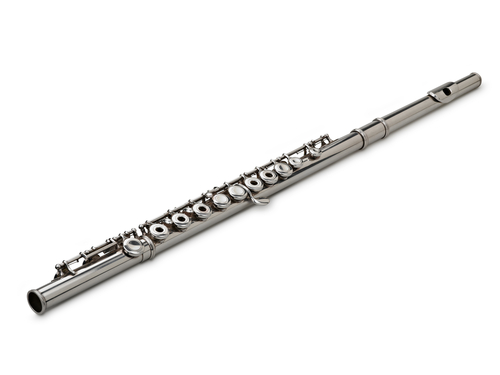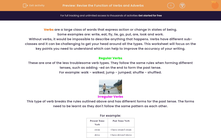Verbs are a large class of words that express action or change in states of being.
Some examples are: write, eat, fly, lie, go, put, are, look and work.
Without verbs, it would be impossible to describe anything that happens. Verbs have different sub-classes and it can be challenging to get your head around all the types.
This activity will focus on the key points you need to understand which can help to improve the accuracy of your writing.
Regular Verbs
These are one of the less troublesome verb types. They follow the same rules when forming different tenses, such as adding -ed on the end to form the past tense.
For example: walk - walked, jump - jumped, shuffle - shuffled.

Irregular Verbs
This type of verb breaks the rules outlined above and has different forms for the past tense. The forms need to be learnt as they don't follow the same pattern as each other.
For example:
|
Present Tense Verb |
Past Tense Verb |
|
swim |
I have swum/I swam |
|
drive |
I have driven/I drove |
|
drink |
I have drunk/I drank |
|
think |
I have thought/I thought |
|
forget |
I have forgotten/I forgot |

Imperative Verbs
Verbs that express direct commands or sound bossy are called imperatives. They are most effective when placed at the start of a sentence and can be used in persuasive or instructive writing.
For example: 'Put the eggs into the bowl.' or 'Come to the zoo today!'

Modal Auxiliary Verbs
These are 'helping' verbs in the sense that they are used alongside main verbs to express different aspects of time and mood. The main ones to use are: will, shall, may, might, can, could, must, ought to, should and would. These can help to create an effective piece of writing giving instructions or advice.
For example: 'You must meet me at 10 pm tonight' or 'You should move on with your life'.

Adverbs
Adverbs are a large class of words. They modify or add further detail to a verb, adjective or other adverbs.
An adverb can be placed directly after a verb in a sentence.
For example: Doreen ran quickly but she hopped slowly.
In this sentence, the adverbs add detail to the verbs.
In some circumstances, an adverb can be placed a few words after the verb in a sentence.
For example: Michael played his flute confidently.

There are also some occasions where an adverb can be placed before a verb in a sentence.
For example: Simon quickly finished his dinner.
In addition to modifying verbs, adverbs can also be placed before adjectives to add further detail.
For example: Flo gave an exceptionally impressive performance at the concert.
Adverbs also function to modify other adverbs.
For example: He very carefully carried the baby upstairs.
In this sentence, the first of the two adverbs ('very') intensifies the second adverb that follows ('carefully').

Now it's over to you.
If you need to check back to any of this information while doing the questions, simply click on the red help button on the screen.








